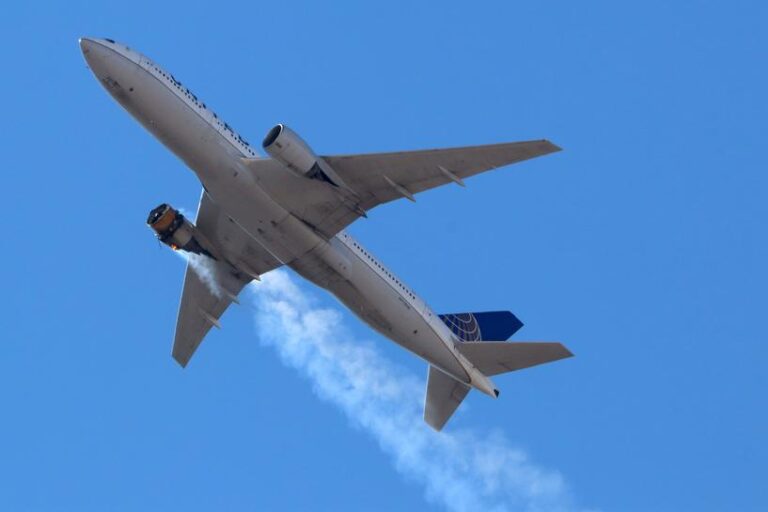
(Reuters) – Showers of jet engine parts over residential areas on both sides of the Atlantic have caught regulators’ attention and prompted the suspension of some older Boeing Co planes from service.
Saturday’s incidents involving a United Airlines 777 in Denver and a Longtail Aviation 747 freighter in the Netherlands put engine maker Pratt & Whitney in the spotlight, though there is no evidence they are related.
Pratt & Whitney, which is owned by Raytheon Technologies Corp, said it was coordinating with regulators to review inspection protocols. It is expected to increase inspections ordered after previous incidents.
After the Colorado engine failure, when United Flight 328 dropped debris on a northern Denver suburb before landing safely, Boeing recommended the suspension of 777s with the same variant of PW4000 turbine. Japan, meanwhile, imposed a mandatory suspension.
The European Union Aviation Safety Agency (EASA) weighed in on Monday, requesting more information on the Pratt engines in light of both events. A woman sustained minor injuries in the Dutch incident, which scattered turbine blades on the town of Meerssen. One was found embedded in a car roof.
After receiving more information, EASA said the incidents were unrelated. “Nothing in the failure and root analysis show any similarity (between the two incidents) at this stage,” the regulator said.
The U.S. Federal Aviation Administration (FAA) said it would soon issue an emergency airworthiness directive based on the United event.
Both incidents involve the same type of PW4000 engine that equips a relatively small number of older planes, some grounded by the COVID-19 pandemic, limiting the likely repercussions.
They nonetheless bring a new headache for Boeing as it recovers from the much more serious 737-MAX crisis, which resulted in the grounding of its flagship narrowbody jet after two deadly crashes.
“This is certainly an unwelcome situation for both Boeing and Pratt, but from time to time issues will pop up with aircraft and engines,” said Greg Waldron, a managing editor at industry publication Flight Global.
“The PW4000-powered 777-200 is slowly fading from service,” he said, adding that the pandemic-driven slump means that airlines forced to suspend it “should be able to fill any network gaps” with 787s or other 777s equipped with General Electric Co engines.
Analysts at broker Cowen predicted limited impact on Boeing’s share price, which fell about 2.1% on Monday.






